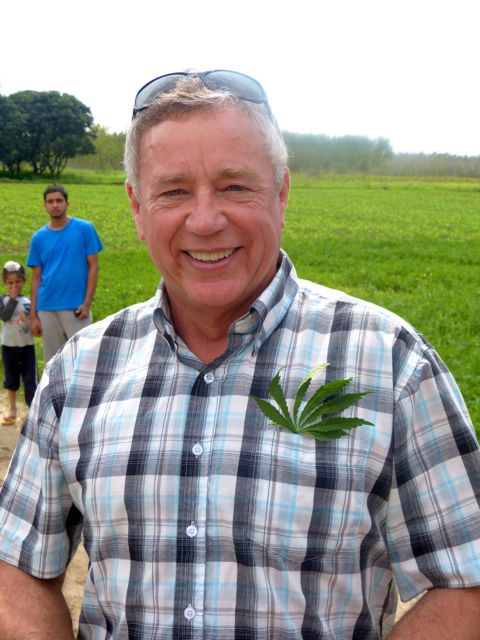Today was dedicated to meeting
Jinder’s extended family and visiting his ancestral villages. Our hosts were beyond welcoming. Three vehicles and various cousins
picked us up from our hotel and dedicated their day to us.
We left the city and drove through
various farming communities to Jinder’s mum’s village, Pajodatta and then his
dad’s, Burrajatta. Compared to the
southern states we visited, Punjab appears to be more modern, greener, and much
cleaner. Clearly, Punjab is the
“bread basket” of India. There are
also many less cattle roaming the area.
While Sikhs do not eat meat, cattle are not held sacred like Hindus. The males are herded into communal
lands, fed and watered, but not allowed to roam. The cows are kept for milking.
 |
Cycling In India
|
 |
Exotic Birds Everywhere.
|
 |
More Modern - But BC Hydro May Say Otherwise.
|
 |
Motorcycle Transport
|
 |
Actually Four - Babe in Arms.
|
 |
Road Work Crew Member - All By Hand
|
I believe we experienced a
snapshot of what life is like in India for the middle class. Not to say it is easy but if a person
owns land, is a smart businessman, and is prepared to work hard, they can have
a very good life. Jinder’s family
has owned land in this area for over 200 years. The land never rests.
Many farmers sow wheat in October, harvest in April, sow rice in April,
and harvest in October. Others grow
sugarcane year around. In both
cases they plant poplar trees amongst the crops. Poplars mature in 5 to 6 years and are used for making
plywood and cricket bats, to name a few.
 |
Poplar Trees with Wheat Crop Below
|
Marijuana grows everywhere. If a crop is not in the ground,
marijuana takes over. The ditches are
full. It is not used for any
purpose in this area. Livestock
and birds will not eat it but there are stories of non-Indian young people
relocating to the area for months at a time to indulge themselves. Food is cheap and weed is plentiful.
 |
Marijuana, Wheat, Poplar
|
 |
Marijuana, Cow patties, Stan
|
We arrived in Pajodatta and met
more family and village neighbors.
Jinder’s cousin, Natha farms the area and keeps a country home as needed
but spends most of his time in residence in Jullundher. Natha is a successful farmer but also gives
back to the village as a patron, supporting both the school and temple.
We walked to the village school
established by Natha’s grandfather seventy years ago and visited the
classrooms. School was in session
and our visit likely ruined the learning environment for the rest of the
day. The kids were excited and eager
to show us their work. The
principal proudly had the best reader in the school read out loud in English for
us. The school housed
preschool-aged kids up to children around eleven. The curriculum is focused on Punjabi, Hindi, English
languages and Mathematics.
 |
Preschoolers and Their Lunch Pail
|
 |
Boys Off To School
|
 |
Three Principals Disturbing Class
|
 |
Principal, George, Natha (Patron)
|
 |
Staff and Preschoolers at Lunch
|
Our visit to Burrajatta was an
emotional one for Jinder. Much of
his first seven years of life were spent in Burrajatta. When we arrived in the village he began
to reminisce about the yard he played in, the tree he played under, the lanes
he walked and the house he slept in.
The village is very similar to when he left it. As we stood on the roof he allowed
himself think about what life might have been like had his father not made the
decision to move.
 |
Jinder's Childhood Yard
|
 |
Entrance to His House
|
 |
His Courtyard Where He Ate and Played
|
The house is still in his family
and an outbuilding his great grandfather built still stands. Their property is now let to local
growers. As we walked out to view his
fields we passed a crew harvesting sugarcane and stopped to have a taste. Workers put in long days for the
equivalent of about $2.60 Canadian a day and three meals.
 |
Girls In The Mustard Field
|
 |
Off To The Fields
|
 |
Sugarcane Harvest
|
 |
Stan Could Not Resist Tryout As A Patty Packer
|
We returned to Pajodatta and
Sukhvinder, Natha’s wife, and the ladies had our lunch prepared. We had the most fabulous Indian
meal and the fresh homegrown vegetables made it the best meal so far.
 |
Everyday Cooking In The Village
|
 |
Preparing Saug (Spinach Dish)
|
We returned to the hotel and some
of us had naps while the others were out shopping the bazaar. Deborah is now in the lead in the Pashmina
count but Doreen has not capitulated as of yet.
We went to a
restaurant/entertainment center called the Haveli. We entered into a fully replicated farming village complete
with life-sized recreations of every aspect of village life. The meal was a traditional vegetarian
meal representing Punjab of old.
We ate and drank some things we were unfamiliar with but so far so
good. Family (yes including us)
pictures were taken and good nights were made with hugs all around.
 |
Our New Jullundher Family
|
I experienced a truly senior
moment when one of the young men shook my hand and then quickly bent and
touched one hand to both my knees.
Kal explained later that that is a sign of respect for ones elders. I guess the grey hair is proving some
worth.
Off to Amritsar and the Golden
Temple tomorrow.






























